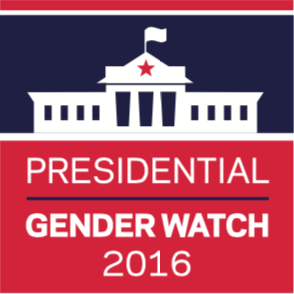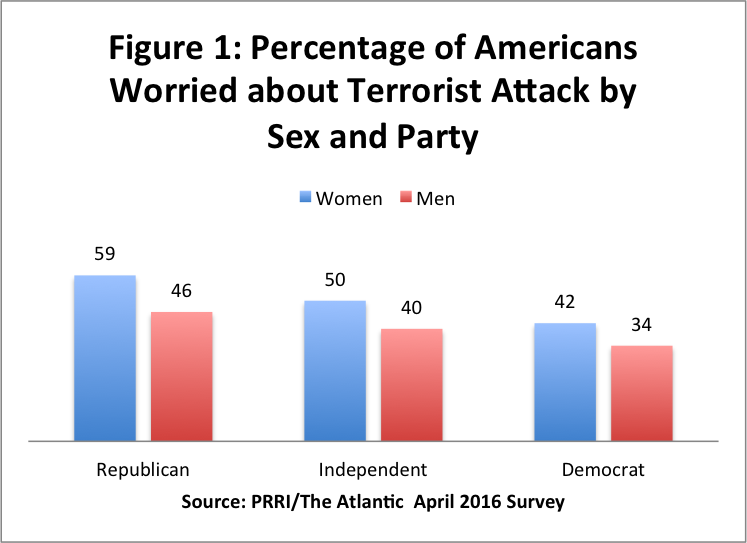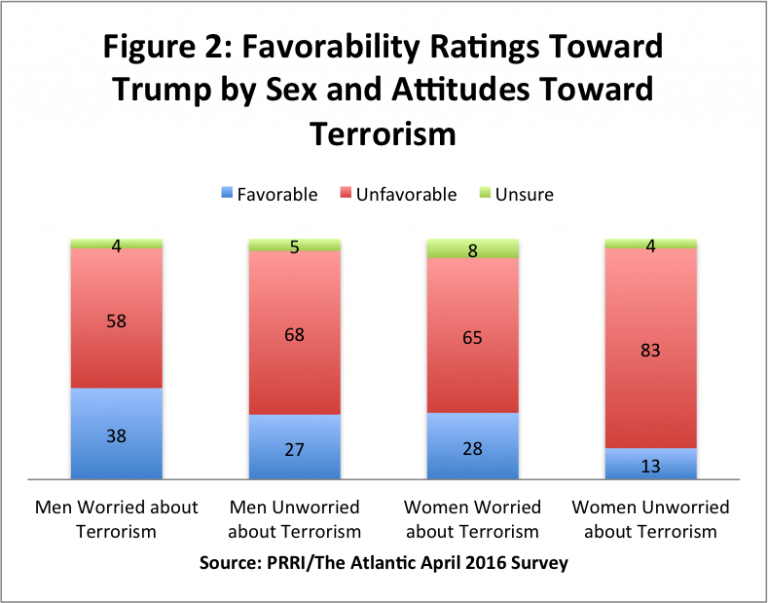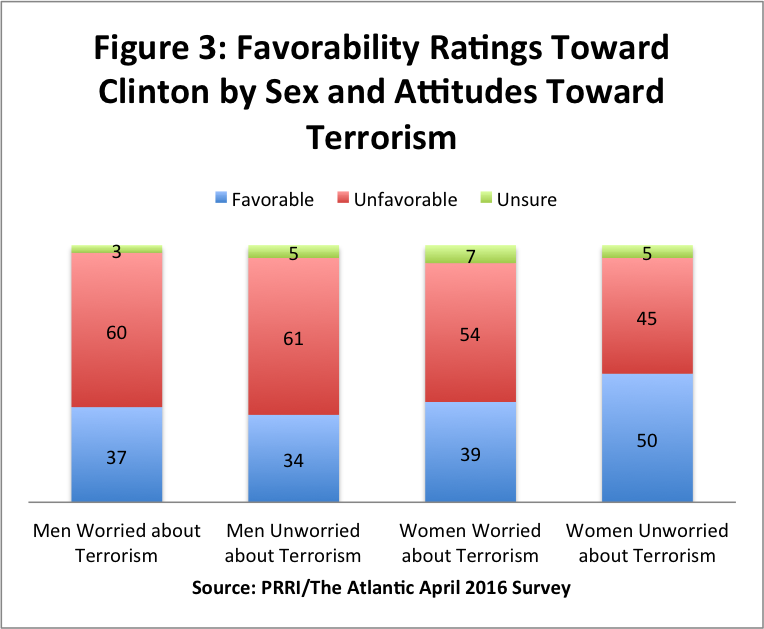Security Moms 2.0?
 In April 2015, the Barbara Lee Family Foundation (BLFF) and the Center for American Women and Politics (CAWP) launched Presidential Gender Watch 2016, a project to track, analyze, and illuminate gender dynamics in the 2016 presidential election. With the help of expert scholars and practitioners, Presidential Gender Watch worked for 21 months to further public understanding of how gender influences candidate strategy, voter engagement and expectations, media coverage, and electoral outcomes in campaigns for the nation’s highest executive office. The blog below was written for Presidential Gender Watch 2016, as part of our collective effort to raise questions, suggest answers, and complicate popular discussions about gender’s role in the presidential race.
In April 2015, the Barbara Lee Family Foundation (BLFF) and the Center for American Women and Politics (CAWP) launched Presidential Gender Watch 2016, a project to track, analyze, and illuminate gender dynamics in the 2016 presidential election. With the help of expert scholars and practitioners, Presidential Gender Watch worked for 21 months to further public understanding of how gender influences candidate strategy, voter engagement and expectations, media coverage, and electoral outcomes in campaigns for the nation’s highest executive office. The blog below was written for Presidential Gender Watch 2016, as part of our collective effort to raise questions, suggest answers, and complicate popular discussions about gender’s role in the presidential race.
It seems that with each presidential contest, the media loves to identify a target women’s constituency as being vital to a campaign’s success. In 1996, pundits claimed that Soccer Moms—largely white, suburban mothers—held the key to Bill Clinton’s re-election. In 2008 and 2012, Democrats worried about Obama’s appeal to WalMart Moms, largely white women with less education who struggle to make ends meet.
This election year is no different, as Donald Trump is taking a page out of George W. Bush’s playbook in 2004 by appealing to Security Moms concerned about terrorism and public safety. While some experts questioned just how successful the Security Mom approach by Bush was in securing his re-election against John Kerry, this has not stopped the Trump campaign and his supporters from making national security a key part of his appeal to voters, especially women. For instance, the pro-Trump super PAC Make America Great Again ran an ad in early GOP primaries featuring a mother getting her kids ready for school, touting Donald Trump’s policies that would tighten our borders and “stop letting in dangerous people.”
To what extent, however, do Americans believe terrorism is a salient campaign issue, and does gender impact such views? Is there any indication that Trump can cut into presumptive Democratic nominee Hillary Clinton’s lead with women voters by using violent imagery and ominous tones that paint America as unsafe and vulnerable to illegal immigrants and jihadists?
Data from last month’s new PRRI/Atlantic poll from PRRI and The Atlantic helps shed light on this question. The poll asked Americans to what extent they are worried that they or someone in their family will be a victim of terrorism finding that Americans are split: 45 percent expressed worry about such an event, compared with 55 percent who do not express much worry about it. However, women do express more concern about such an event than men: 49 percent of American women are worried that they or someone in their family will be a victim of terrorism, compared with 40 percent of men.

Not surprisingly, partisanship colors such views. Figure 1 shows the breakdown of attitudes about terrorism for men and women by party. As the data reveal, Republicans more generally express concern about terrorism compared than either independents or Democrats, with women in each party category more concerned about terrorism than men. Close to six in ten Republican women are concerned about being the victim of terrorism while half of independent women—the sorts of voters Trump will need to turn out in high numbers in November to do well—express similar concerns.
Such relatively high levels of concern about terrorism among women in particular may help explain why the Trump campaign is touting national security as a major theme of this campaign. And, while Trump’s favorability ratings are largely in the tank with most Americans, those who express the most concern about terrorism tend to view Trump more positively than those who do not, as Figure 2 demonstrates: about one-third of Americans who are worried about terrorism give Trump favorable ratings, compared with just one in five other Americans. Trump gets a slightly higher boost in favorability among women voters, however: 28 percent of women who are concerned about terrorism rate Trump favorably, compared with just 13 percent of women who are not concerned about terrorism.
 That pattern among women is reversed when it comes to attitudes about Hillary Clinton. While Clinton enjoys higher favorability ratings compared with Trump overall, women who express concern about terrorism are significantly less likely to rate her favorably (39 percent) compared with women who are not concerned about terrorism (50 percent). Notably, fears of a terrorist attack do not drive men’s attitudes about Clinton at all, which again makes Trump’s appeals to women about terrorism more understandable, given that terrorism appears to be a slight wedge issue among women voters.
That pattern among women is reversed when it comes to attitudes about Hillary Clinton. While Clinton enjoys higher favorability ratings compared with Trump overall, women who express concern about terrorism are significantly less likely to rate her favorably (39 percent) compared with women who are not concerned about terrorism (50 percent). Notably, fears of a terrorist attack do not drive men’s attitudes about Clinton at all, which again makes Trump’s appeals to women about terrorism more understandable, given that terrorism appears to be a slight wedge issue among women voters.
For now, at least, it is doubtful that concerns about terrorism alone will be enough for Trump to appeal to women voters, particularly the independent women voters he needs to win in November. Moreover, some of the policies he supports to make America safer, such as temporarily banning Muslims from entering the country, are broadly unpopular, especially with women. PRRI’s data show that just 34 percent of Republican women and 24 percent of independent women support such a policy. Yet, if America is unfortunate enough to suffer a major terrorist attack between now and November, fears about terrorism will likely take precedence in the campaign, and we can count on Donald Trump making gendered appeals about how he, and not Hillary Clinton, is best poised to keep America’s families safe.


